 Libri di Lorraine Daston su Unilibro.it) Libri di Lorraine Daston su Unilibro.it)
|
|
2024 |
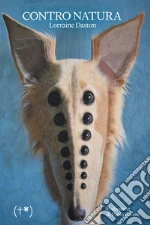 Title :
Contro natura
Title :
Contro naturaAuthor: Daston Lorraine Publisher: Timeo (Palermo) Da sempre - in ogni luogo, epoca e cultura - gli esseri umani hanno chiamato in causa la natura per avvalorare o difendere modelli sociali e principi morali diversissimi, spesso addirittura antitetici: il razzismo e i diritti umani universali, il darwinismo sociale e il dovere di mutuo sostegno, il sistema di caste e l'egalitarismo. Ma come si è giunti a far coincidere ciò che è «naturale» con ciò che è giusto e ciò che è «contro natura» con una deprecabile aberrazione morale? E come è possibile che le drastiche e irreversibili rivoluzioni nei costumi e nelle leggi - e le profonde riflessioni filosofiche e politiche che le hanno accompagnate - nulla abbiano potuto per sradicare l'umana tentazione, o necessità, di derivare un ordine morale da quello naturale? Per rispondere a queste domande Lorraine Daston analizza tre particolari tipi di ordine che ricorrono in tutta la tradizione filosofica occidentale - la natura delle specie, la natura dei luoghi e le leggi natura universali - scoprendo che, di fronte al sovvertimento di questi ordini, siamo travolti da emozioni altrettanto specifiche (e spesso violente): l'orrore, il terrore e lo stupore. Partendo da questa brillante cornice interpretativa, Daston ci conduce in un'avvincente indagine storica e filosofica che esplora la natura delle norme, il nostro coinvolgimento emotivo nelle violazioni dell'ordine morale e il nostro incessante bisogno di cercare nella natura la legittimazione delle nostre regole, e fornisce risposte altrettanto brillanti in grado di incastonare l'infinita mutevolezza delle norme nel quadro universale € 15,00
Scontato: € 14,25
|
|
|
1917 |
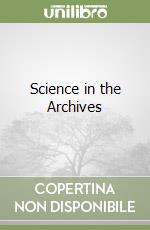 Title :
Science in the Archives
Title :
Science in the ArchivesAuthor: Daston Lorraine (EDT) Publisher: Univ of Chicago Pr € 114,40
|
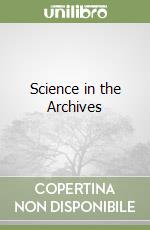 Title :
Science in the Archives
Title :
Science in the ArchivesAuthor: Daston Lorraine (EDT) Publisher: Univ of Chicago Pr € 40,40
|
|
1916 |
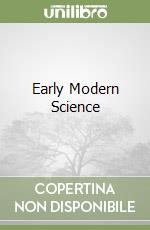 Title :
Early Modern Science
Title :
Early Modern ScienceAuthor: Park Katharine (EDT), Daston Lorraine (EDT) Publisher: Cambridge Univ Pr € 47,30
|
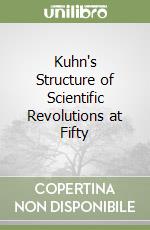 Title :
Kuhn's Structure of Scientific Revolutions at Fifty
Title :
Kuhn's Structure of Scientific Revolutions at FiftyAuthor: Richards Robert J. (EDT), Daston Lorraine (EDT) Publisher: Univ of Chicago Pr € 75,90
|
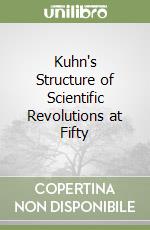 Title :
Kuhn's Structure of Scientific Revolutions at Fifty
Title :
Kuhn's Structure of Scientific Revolutions at FiftyAuthor: Richards Robert J. (EDT), Daston Lorraine (EDT) Publisher: Univ of Chicago Pr € 26,60
|
|
1913 |
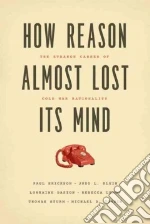 Title :
How Reason Almost Lost Its Mind
Title :
How Reason Almost Lost Its MindAuthor: Erickson Paul, Klein Judy L., Daston Lorraine, Lemov Rebecca, Sturm Thomas Publisher: Univ of Chicago Pr In the United States at the height of the Cold War, roughly between the end of World War II and the early 1980s, a new project of redefining rationality commanded the attention of sharp minds, powerful politicians, wealthy foundations, and top military brass. Its home was the human sciences—psychology, sociology, political science, and economics, among others—and its participants enlisted in an intellectual campaign to figure out what rationality should mean and how it could be deployed. How Reason Almost Lost Its Mind brings to life the people—Herbert Simon, Oskar Morgenstern, Herman Kahn, Anatol Rapoport, Thomas Schelling, and many others—and places, including the RAND Corporation, the Center for Advanced Study in the Behavioral Sciences, the Cowles Commission for Research and Economics, and the Council on Foreign Relations, that played a key role in putting forth a “Cold War rationality.” Decisionmakers harnessed this picture of rationality—optimizing, formal, algorithmic, and mechanical—in their quest to understand phenomena as diverse as economic transactions, biological evolution, political elections, international relations, and military strategy. The authors chronicle and illuminate what it meant to be rational in the age of nuclear brinkmanship. € 40,40
|
|
|
1911 |
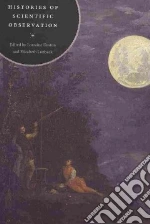 Title :
Histories of Scientific Observation
Title :
Histories of Scientific ObservationAuthor: Daston Lorraine (EDT), Lunbeck Elizabeth (EDT) Publisher: Univ of Chicago Pr Observation is the most pervasive and fundamental practice of all the modern sciences, both natural and human. Its instruments include not only the naked senses but also tools such as the telescope and microscope, the questionnaire, the photographic plate, the notebook, the glassed-in beehive, and myriad other ingenious inventions designed to make the invisible visible, the evanescent permanent, the abstract concrete. Yet observation has almost never been considered as an object of historical inquiry in itself. This wide-ranging collection offers the first examination of the history of scientific observation in its own right, as both epistemic category and scientific practice. Histories of Scientific Observation features engaging episodes drawn from across the spectrum of the natural and human sciences, ranging from meteorology, medicine, and natural history to economics, astronomy, and psychology. The contributions spotlight how observers have scrutinized everything—from seaweed to X-ray radiation, household budgets to the emotions—with ingenuity, curiosity, and perseverance verging on obsession. This book makes a compelling case for the significance of the long, surprising, and epistemologically significant history of scientific observation, a history full of innovations that have enlarged the possibilities of perception, judgment, and reason. € 36,10
|
|
|
1910 |
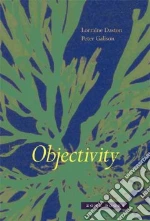 Title :
Objectivity
Title :
ObjectivityAuthor: Daston Lorraine, Galison Peter Publisher: Zone Books Objectivity has a history, and it is full of surprises. In Objectivity, Lorraine Daston and Peter Galison chart the emergence of objectivity in the mid-nineteenth-century sciences--and show how the concept differs from its alternatives, truth-to-nature and trained judgment. This is a story of lofty epistemic ideals fused with workaday practices in the making of scientific images. From the eighteenth through the early twenty-first centuries, the images that reveal the deepest commitments of the empirical sciences--from anatomy to crystallography--are those featured in scientific atlases, the compendia that teach practitioners what is worth looking at and how to look at it. Galison and Daston use atlas images to uncover a hidden history of scientific objectivity and its rivals. Whether an atlas maker idealizes an image to capture the essentials in the name of truth-to-nature or refuses to erase even the most incidental detail in the name of objectivity or highlights patterns in the name of trained judgment is a decision enforced by an ethos as well as by an epistemology. As Daston and Galison argue, atlases shape the subjects as well as the objects of science. To pursue objectivity--or truth-to-nature or trained judgment--is simultaneously to cultivate a distinctive scientific self wherein knowing and knower converge. Moreover, the very point at which they visibly converge is in the very act of seeing not as a separate individual but as a member of a particular scientific community. Embedded in the atlas image, therefore, are the traces of consequential choices about knowledge, persona, and collective sight. Objectivity is a book addressed to anyone interested in the elusive and crucial notion of objectivity-- and in what it means to peer into the world scientifically. Lorraine Daston is Director at the Max Planck Institute for the History of Science in Berlin, Germany. She is the coauthor of Wonders and the Order of Nature, 1150-1750 and the editor of Things That Talk: Object Lessons from Art and Science (both Zone Books). Peter Galison is Pellegrino University Professor of the History of Science and of Physics at Harvard University. He is the author of Einstein's Clocks, Poincaré's Maps: Empires of Time, How Experiments End, and Image and Logic: A Material Culture of Microphysics, and other books, and coeditor (with Emily Thompson) of The Architecture of Science (MIT Press, 1999). € 26,80
|
|
|
2007 |
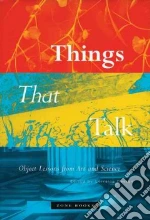 Title :
Things That Talk
Title :
Things That TalkAuthor: Daston Lorraine (EDT) Publisher: Zone Books Imagine a world without things. There would be nothing to describe, nothing to explain, remark, interpret, or complain about. Without things, we would stop speaking; we would become as mute as things are alleged to be. In nine original essays, internationally renowned historians of art and of science seek to understand how objects become charged with significance without losing their gritty materiality. True to the particularity of things, each of the essays singles out one object for close attention: a Bosch drawing, the freestanding column, a Prussian island, soap bubbles, early photographs, glass flowers, Rorschach blots, newspaper clippings, paintings by Jackson Pollock. Each is revealed to be a node around which meanings accrete thickly. But not just any meanings: what these things are made of and how they are made shape what they can mean. Neither the pure texts of semiotics nor the brute objects of positivism, these things are saturated with cultural significance. Things become talkative when they fuse matter and meaning; they lapse into speechlessness when their matter and meanings no longer mesh. Each of the nine objects examined in this book had its historical moment, when the match of this thing to that thought seemed irresistible. At these junctures, certain things become objects of fascination, association, and endless consideration; they begin to talk. Things that talk fleetingly realize the dream of a perfect language, in which words and world merge.Essays Lorraine Daston, Peter Galison, Anke te Heesen, Caroline A. Jones, Joseph Leo Koerner, Antoine Picon, Simon Schaffer, Joel Snyder, and M. Norton and Elaine M. Wise. Lorraine Daston is Director at the Max Planck Institute for the History of Science in Berlin, Germany. She is the coauthor of Wonders and the Order of Nature, 1150-1750 (Zone Books). € 20,50
|
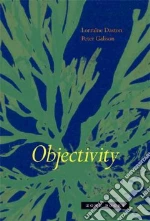 Title :
Objectivity
Title :
ObjectivityAuthor: Daston Lorraine, Galison Peter Publisher: Mit Pr Objectivity has a history, and it is full of surprises. In Objectivity, Lorraine Daston and Peter Galison chart the emergence of objectivity in the mid-nineteenth-century sciences--and show how the concept differs from its alternatives, truth-to-nature and trained judgment. This is a story of lofty epistemic ideals fused with workaday practices in the making of scientific images. From the eighteenth through the early twenty-first centuries, the images that reveal the deepest commitments of the empirical sciences--from anatomy to crystallography--are those featured in scientific atlases, the compendia that teach practitioners what is worth looking at and how to look at it. Galison and Daston use atlas images to uncover a hidden history of scientific objectivity and its rivals. Whether an atlas maker idealizes an image to capture the essentials in the name of truth-to-nature or refuses to erase even the most incidental detail in the name of objectivity or highlights patterns in the name of trained judgment is a decision enforced by an ethos as well as by an epistemology. As Daston and Galison argue, atlases shape the subjects as well as the objects of science. To pursue objectivity--or truth-to-nature or trained judgment--is simultaneously to cultivate a distinctive scientific self wherein knowing and knower converge. Moreover, the very point at which they visibly converge is in the very act of seeing not as a separate individual but as a member of a particular scientific community. Embedded in the atlas image, therefore, are the traces of consequential choices about knowledge, persona, and collective sight. Objectivity is a book addressed to anyone interested in the elusive and crucial notion of objectivity-- and in what it means to peer into the world scientifically. Lorraine Daston is Director at the Max Planck Institute for the History of Science in Berlin, Germany. She is the coauthor of Wonders and the Order of Nature, 1150-1750 and the editor of Things That Talk: Object Lessons from Art and Science (both Zone Books). Peter Galison is Pellegrino University Professor of the History of Science and of Physics at Harvard University. He is the author of Einstein's Clocks, Poincaré's Maps: Empires of Time, How Experiments End, and Image and Logic: A Material Culture of Microphysics, and other books, and coeditor (with Emily Thompson) of The Architecture of Science (MIT Press, 1999). € 34,80
|
|
2006 |
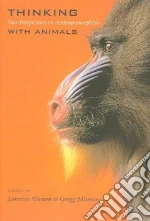 Title :
Thinking with Animals
Title :
Thinking with AnimalsAuthor: Daston Lorraine (EDT), Mitman Gregg (EDT) Publisher: Columbia Univ Pr Is anthropomorphism a scientific sin? Scientists and animal researchers routinely warn against 'animal stories,' and contrast rigorous explanations and observation to facile and even fanciful projections about animals. Yet many of us, scientists and researchers included, continue to see animals as humans and humans as animals. As this innovative new collection demonstrates, humans use animals to transcend the confines of self and species; they also enlist them to symbolize, dramatize, and illuminate aspects of humans' experience and fantasy. Humans merge with animals in stories, films, philosophical speculations, and scientific treatises. In their performance with humans on many stages and in different ways, animals move us to think. From Victorian vivisectionists to elephant conservation, from ancient Indian mythology to pet ownership in the contemporary United States, our understanding of both animals and what it means to be human has been shaped by anthropomorphic thinking. The contributors to Thinking with Animals explore the how and why of anthropomorphism, drawing attention to its rich and varied uses. Prominent scholars in the fields of anthropology, ethology, history, and philosophy, as well as filmmakers and photographers, take a closer look at how deeply and broadly ways of imagining animals have transformed humans and animals alike. Essays in the book investigate the changing patterns of anthropomorphism across different time periods and settings, as well as their transformative effects, both figuratively and literally, upon animals, humans, and their interactions. Examining how anthropomorphic thinking 'works' in a range of different contexts, contributors reveal the ways in which anthropomorphism turns out to be remarkably useful: it can promote good health and spirits, enlist support in political causes, sell products across boundaries of culture of and nationality, crystallize and strengthen social values, and hold up a philosophical mirror to the human predicament. € 36,10
|
|
|
2004 |
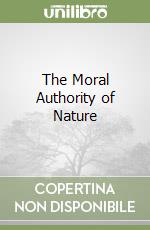 Title :
The Moral Authority of Nature
Title :
The Moral Authority of NatureAuthor: Daston Lorraine (EDT), Vidal Fernando (EDT) Publisher: Univ of Chicago Pr € 99,90
|
|
|
2003 |
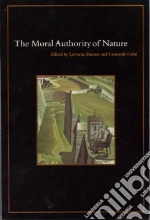 Title :
The Moral Authority of Nature
Title :
The Moral Authority of NatureAuthor: Daston Lorraine (EDT), Vidal Fernando (EDT) Publisher: Univ of Chicago Pr For thousands of years, people have used nature to justify their political, moral, and social judgments. Such appeals to the moral authority of nature are still very much with us today, as heated debates over genetically modified organisms and human cloning testify. The Moral Authority of Nature offers a wide-ranging account of how people have used nature to think about what counts as good, beautiful, just, or valuable. The eighteen essays cover a diverse array of topics, including the connection of cosmic and human orders in ancient Greece, medieval notions of sexual disorder, early modern contexts for categorizing individuals and judging acts as 'against nature,' race and the origin of humans, ecological economics, and radical feminism. The essays also range widely in time and place, from archaic Greece to early twentieth-century China, medieval Europe to contemporary America. Scholars from a wide variety of fields will welcome The Moral Authority of Nature, which provides the first sustained historical survey of its topic. Contributors: Danielle Allen, Joan Cadden, Lorraine Daston, Fa-ti Fan, Eckhardt Fuchs, Valentin Groebner, Abigail J. Lustig, Gregg Mitman, Michelle Murphy, Katharine Park, Matt Price, Robert N. Proctor, Helmut Puff, Robert J. Richards, Londa Schiebinger, Laura Slatkin, Julia Adeney Thomas, Fernando Vidal € 39,30
|
|
|
2001 |
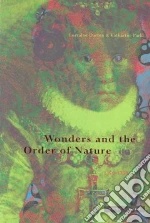 Title :
Wonders and the Order of Nature, 1150-1750
Title :
Wonders and the Order of Nature, 1150-1750Author: Daston Lorraine, Park Katharine Publisher: Zone Books Winner of the History of Science Society's Pfizer Prize Wonders and the Order of Nature is about the ways in which European naturalists from the High Middle Ages through the Enlightenment used wonder and wonders, the passion and its objects, to envision themselves and the natural world. Monsters, gems that shone in the dark, petrifying springs, celestial apparitions—these were the marvels that adorned romances, puzzled philosophers, lured collectors, and frightened the devout. Drawing on the histories of art, science, philosophy, and literature, Lorraine Daston and Katharine Park explore and explain how wonder and wonders fortified princely power, rewove the texture of scientific experience, and shaped the sensibility of intellectuals. This is a history of the passions of inquiry, of how wonder sometimes inflamed, sometimes dampened curiosity about nature's best-kept secrets. Refracted through the prism of wonders, the order of nature splinters into a spectrum of orders, a tour of possible worlds. € 26,80
|
|
|
2000 |
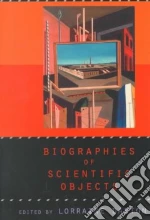 Title :
Biographies of Scientific Objects
Title :
Biographies of Scientific ObjectsAuthor: Daston Lorraine (EDT) Publisher: Univ of Chicago Pr Why does an object or phenomenon become the subject of scientific inquiry? Why do some of these objects remain provocative, while others fade from center stage? And why do objects sometimes return as the focus of research long after they were once abandoned? Addressing such questions, Biographies of Scientific Objects is about how whole domains of phenomena--dreams, atoms, monsters, culture, society, mortality, centers of gravity, value, cytoplasmic particles, the self, tuberculosis--come into being and sometimes pass away as objects of scientific study. With examples drawn from both the natural and social sciences, and ranging from the sixteenth to the twentieth centuries, this book explores the ways in which scientific objects are both real and historical. Whether discovered or invented, these objects of inquiry broaden and deepen in meaning--growing more 'real'--as they become entangled in webs of cultural significance, material practices, and theoretical derivations. Thus their biographies will matter to anyone concerned with the formation of scientific knowledge. Contributors are Jed Z. Buchwald, Lorraine Daston, Rivka Feldhay, Jan Goldstein, Gerard Jorland, Doris Kauffman, Bruno Latour, Theodore M. Porter, Hans-Jörg Rheinberger, Marshall Sahlins, and Peter Wagner. € 36,10
|
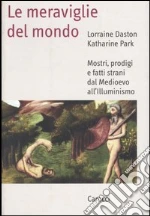 Title :
Le meraviglie del mondo. Mostri, prodigi e fatti strani dal Medioevo all'illuminismo
Title :
Le meraviglie del mondo. Mostri, prodigi e fatti strani dal Medioevo all'illuminismoAuthor: Daston Lorraine; Park Katharine Publisher: Carocci Alla sensibilità di oggi potrà apparire strano, ma per secoli la cultura europea ha dedicato un'attenzione costante a mostri e prodigi, portenti e miracoli, mirabilia di ogni forma e natura. Uova di struzzo e corni d'unicorno, sorgenti curative e tessuti rari, automi e congegni meccanici sono stati di volta in volta fonti di paura o di piacere, oggetti da esibire in spettacoli o da analizzare con cura. A firma di due delle più autorevoli storiche dell'ultima generazione, il libro ricostruisce la storia e il significato di questo universo popolato di fatti strani e delle reazioni di meraviglia, curiosità e timore che esso ha via via suscitato su scienziati e filosofi, collezionisti e viaggiatori, medici e letterati. € 33,00
Scontato: € 31,35
|
|
1998 |
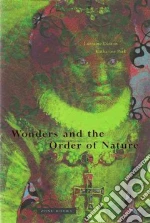 Title :
Wonders and the Order of Nature 1150-1750
Title :
Wonders and the Order of Nature 1150-1750Author: Daston Lorraine, Park Katharine Publisher: Mit Pr Winner of the History of Science Society's Pfizer Prize'This book is about setting the limits of the natural and the limits of the known, wonders and wonder, from the High Middle Ages through the Enlightenment. A history of wonders as objects of natural inquiry is simultaneously an intellectual history of the orders of nature. A history of wonder as a passion of natural inquiry is simultaneously a history of the evolving collective sensibility of naturalists. Pursued in tandem, these interwoven histories show how the two sides of knowledge, objective order and subjective sensibility, were obverse and reverse of the same coin rather than opposed to one another.'-- From the IntroductionWonders and the Order of Nature is about the ways in which European naturalists from the High Middle Ages through the Enlightenment used wonder and wonders, the passion and its objects, to envision themselves and the natural world. Monsters, gems that shone in the dark, petrifying springs, celestial apparitions--these were the marvels that adorned romances, puzzled philosophers, lured collectors, and frightened the devout. Drawing on the histories of art, science, philosophy, and literature, Lorraine Daston and Katharine Park explore and explain how wonder and wonders fortified princely power, rewove the texture of scientific experience, and shaped the sensibility of intellectuals. This is a history of the passions of inquiry, of how wonder sometimes inflamed, sometimes dampened curiosity about nature's best-kept secrets. Refracted through the prism of wonders, the order of nature splinters into a spectrum of orders, a tour of possible worlds. € 36,10
|
|
|
1995 |
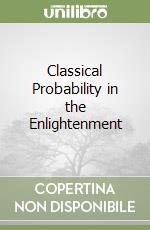 Title :
Classical Probability in the Enlightenment
Title :
Classical Probability in the EnlightenmentAuthor: Daston Lorraine Publisher: Princeton Univ Pr What did it mean to be reasonable in the Age of Reason? Classical probabilists from Jakob Bernouli through Pierre Simon Laplace intended their theory as an answer to this question--as 'nothing more at bottom than good sense reduced to a calculus,' in Laplace's words. In terms that can be easily grasped by nonmathematicians, Lorraine Daston demonstrates how this view profoundly shaped the internal development of probability theory and defined its applications. € 76,20
|